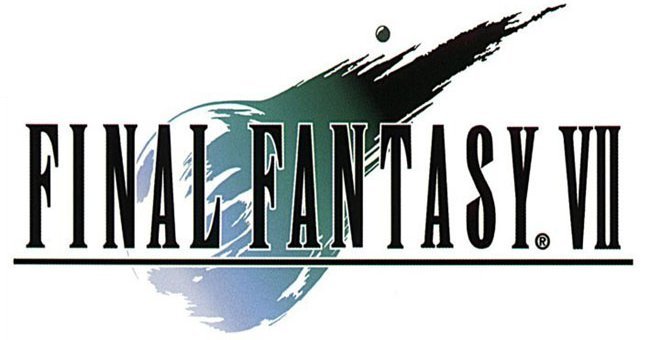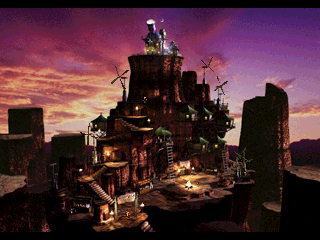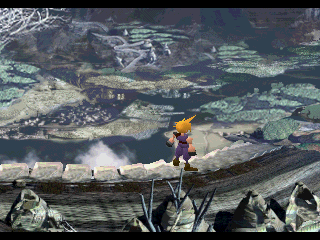Last updated on March 3, 2013
Can anyone really do this game any justice? Probably not. But let’s say if I didn’t cover the behemoth in the room, I’d obviously lose my street cred. Final Fantasy VII deserves a place on The List for myriad reasons, as you’ll see.
So, here’s the weird thing: Final Fantasy VII has its fair share of people who treat it with utter adoration, or scorn and derision. Usually they fall into two groups, those who played video games prior to its release, and those who were coming into the fold at the time of its release. In general, the former hate it with a passion I have not seen rivaled in many other places, while the latter ignore its flaw and problems entirely. Perhaps you had the game leave an indelible mark on your heart, or a blight on you soul, but these two parties aren’t going to meet any time soon.
Of course, the main problem with both sides is an emotional attachment to the game because they played it and loved/hated it in 1997. I don’t have that particular problem. My secret shame of video games is that I have never played Final Fantasy VII until recently, last Fall and early this year to be exact. My experience with Final Fantasies started with IV, then to IX, then XIII. Frankly, I don’t know whether I am slightly manic and ADD or I just didn’t feel like playing it. Part of it was public perception as noted above; the vitriol of Jeremy Parish’s initial take on the matter made me a bit tepid towards a game I hadn’t even played.
Furthermore, all I really knew of the game came from Square-Enix, who (now that I’ve played it through once) don’t really understand why the game was a success in the first place. They portray the game as if Cloud was a mopey emo kid who always speaks in monotone and fights with a big sword. Sephiroth, in those situations, is little more than a deus ex machina, a stupid villain-out-of-nowhere who comes into the fray simply to present an obstacle to the protagonist. I think the movie Advent Children, or Dissidia, or any number of other properties Square-Enix has created and released show this. Even their later games try to recreate what they think was great about Final Fantasy VII, to recapture the magic. Final Fantasy XIII, for all the fun I had with it, was exactly what I thought Final Fantasy VII would become, with a vapid and completely confusing plot, a cast of unlikable, and preachy, characters, and pretty graphics at the expense of content. Now, I’m sure you see my own prejudice against Final Fantasy XIII, but I think most people would see it as warranted. Not that I didn’t enjoy it, but will I remember Lightning over Cecil? Probably not.
Regarding Final Fantasy VII, on all sides, we’ve come to this work with presuppositions, misperception, and obstinancy. I think it’s time to take a step back and look at this again.
To preface, I like Final Fantasy games. I like the games, I like random battles, I like battle systems, I like the stories (however absurd they tend to be), and graphics are not much of a concern. When it comes to aesthetics, each one has its own art style, whether derived from Yoshitaka Amano or Tetsuya Nomura, that fits with the themes and elements of the game. Perhaps I’m just too accepting of whatever a game looks like, but when one compares VII to XIII, it’s a no contest. I tend to prefer something simple, something clean like 2D sprites. I am focused on how the battles play, and if the battle system is interesting and provides options and challenges, then I am all set. Even if your story isn’t great, I’ll still play for the battle system (see: every Tri-Ace game after Valkyrie Profile). Still, I’d prefer some kind of story, and even a mediocre one will do.
So, I imagine, for me to say that Final Fantasy VII is an excellent game with a great story, even today, should strike you as a compliment, to say the least. I was initially surprised, then enraptured by the game for about 33 hours or so, and now I am here to tell you about it.
We might say, 15 years down the line, that Final Fantasy VII no longer can wow the audience with its graphical capabilities. However, this actually works to the game’s advantange. Take, for example, the multiple forms of presentation. We have the realistic version depicted in cutscenes, the battle version, and the ball head-and-arms versions of all three character. The “bad” graphics aren’t so much a limitation of the technology as they are a design decision, possibly unintentional, a means by which to bridge the gap between Final Fantasy VI and VII. Imagine, for example, having some of the expressions and moments that the game actually has that are genuinely funny; could this be achieved in FFXIII? I can’t even imagine a single time that better graphics, in that case, actually lent itself to a better story or a more relatable one, at the very least. Yet, Final Fantasy VII’s Popeye arm people feel more real, more like actual people, than Square-Enix’s later offerings. There’s a certain layer of emotion and action you can convey using cartoonish characters, pantomiming simple motions, that can convey personality and emotion without voice acting or anything of the sort.
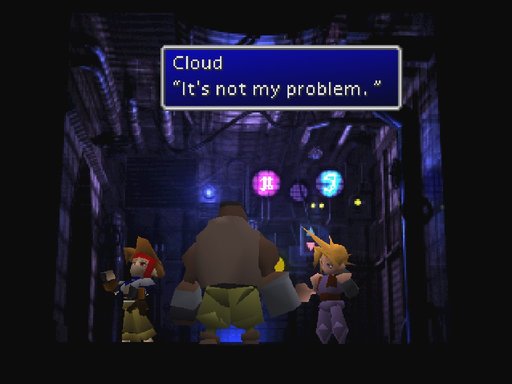
Or, could you ever see Lightning, Sazh, Hope, Snow, Fang, and Vanille decide to snowboard, being accosted by snowmen and penguins along the way? Or cross-dress to make it into a bordello convincingly in order to woo a overweight crime boss?
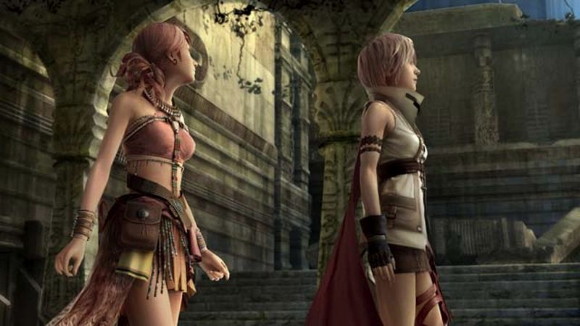
That’s not to say that Final Fantasy VII doesn’t take itself seriously; it does, for sure. But that doesn’t mean that the game doesn’t have its own moments of brightness and levity. Even in the moments of darkest human despair, there’s always a Cid to pipe up with some misogynist quip, or Barrett to let out a string of expletives that I had a great deal of fun figuring out. Even Cloud and the rest have their moments. Yoshinori Kitase, if this is any evidence, is an excellent writer with the ability to convey a diverse array of moods represented by myriad character. The best way in a work of fiction to actually create a meaningful emotional connection is obviously in your characters, and if they can convey themselves easily without text and with little effort, all the better. As Pat says,
Except for a few all-purpose poses and a maybe a few special sprites for certain story-required situations, 2D JRPGs usually don’t do character body language so well. 3D models are much more flexible, and Square uses this new trick to create the only part of Aeris’s death scene that still has any effect on my cold, jaded heart. Each of the two other party members there with Cloud take turns stepping forward, looking down at Aeris, and having his or her own unique reaction to the sight. We watch them expressing grief and communicating with Cloud purely through body language. The way each character responds to the death of a companion helps round them out in ways that five pages’ worth of dialogue boxes can’t. And the whole time, nobody says a single damn word. If only the rest of the scene had been handled so adroitly.
But the dialogue is indeed good! I was so surprised by how alive they feel. I had to look at Final Fantasy XIII to make sure I wasn’t missing something; yes, they copied everything archetype of the game down to a tee, everything but its soul. Barrett adopted the child of his best friend Dyne, who he also had to kill in the end – what character in FFXIII even comes close to that? What a motivation to save the world, a realistic one, not just some teenage-hokum about following my own destiny (fal’Cie, L’Cie, again.) I feel as if I’m being mean to FFXIII, but comparing the two shows just how much the modern Final Fantasy paradigm lacks the human element, which has been glossed over, buffed, and waxed out of existence with strawberry flowing hair.
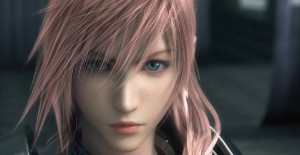
I’ve never understood critiques about the plot, either. I think the problem lies in the analysis of the plot details, rather than the actual story. The mechanics of Sephiroth, Jenova, the Ancients, Shinra, Lifestream, Weapons, etc., are really all ancillary to the ideas they represent; a superficial analysis of “what does what”, how the elements interact, and those methodologies really don’t hit the heart of the matter. They’re not just a confluence of whatever idea tends to stick out in the moment, like Final Fantasy VIII’s silly and dumb TIME COMPRESSION device, or Final Fantasy XIII’s fal’cie/L’Cie nonsense. Rather, we have something of an environmental fable, commentary on the human condition, consequences of genetic manipulation and “humans playing God”, and a journey of self-discovery all rolled into one “role-playing” game. Have you ever thought of the game in those terms?
What else could Midgar represent other than the ravaging of the environment, and also of the spiritual connection that is lost due to rampant technology advancement? Shinra reaps the rewards of the Planet (more a deity or entity than a hunk of rock in the game), but they suck its life out as a result. How humanity treats the planet inevitably affects how they treat other human beings; Shinra kills without mercy and honor, and kills its own citizens for personal gain. To say that Shinra is capitalism taken to its ultimate end really doesn’t even do it justice; it’s not even an idea, a philosophy, or anything else, but a Hobbesian basic “state of nature”. This is who we are as human beings – we are Shinra. We always want to put the blame on the companies, but we, through convenience and a haughty attitude, convince ourselves otherwise. We want to “love the Planet”, or some worthless platitude to that effect. But this isn’t something you can simply understand at face value, for as Paul says in Romans 1:18-31,
For the wrath of God is revealed from heaven against all ungodliness and unrighteousness of men who suppress the truth in unrighteousness, because that which is known about God is evident within them; for God made it evident to them. For since the creation of the world His invisible attributes, His eternal power and divine nature, have been clearly seen, being understood through what has been made, so that they are without excuse. For even though they knew God, they did not honor Him as God or give thanks, but they became futile in their speculations, and their foolish heart was darkened. Professing to be wise, they became fools, and exchanged the glory of the incorruptible God for an image in the form of corruptible man and of birds and four-footed animals and crawling creatures.
Therefore God gave them over in the lusts of their hearts to impurity, so that their bodies would be dishonored among them. For they exchanged the truth of God for a lie, and worshiped and served the creature rather than the Creator, who is blessed forever. Amen…And just as they did not see fit to acknowledge God any longer, God gave them over to a depraved mind, to do those things which are not proper, being filled with all unrighteousness, wickedness, greed, evil; full of envy, murder, strife, deceit, malice; they are gossips, slanderers, haters of God, insolent, arrogant, boastful, inventors of evil, disobedient to parents, without understanding, untrustworthy, unloving, unmerciful; and although they know the ordinance of God, that those who practice such things are worthy of death, they not only do the same, but also give hearty approval to those who practice them.
If the Apostle Paul played video games, I’m pretty sure he would have seen it too!
However, the rampant quest for technology leads, inevitably, to their own downfall. The arrival of Jenova onto the planet thousands of years in the past engenders a search for a new technology, a new source of power. Once the power is found, it is injected into the womb of the newest Shinra SOLDIER, who we all know as Sephiroth. The Ancients defeated her because she was a danger to the Planet; now, she becomes a new source of power, one that leads to our downfall. Aeris, as a descendant of the Ancients, is our link to that past in the story, the modern representation of that conflict.
Sephiroth, then, is less an iconic video game villain than he is a force of nature, a creation of doom and destruction wrought from the quest of mankind to seek power beyond their own comprehension and ability to control. Sephiroth is alien to the Planet because he isn’t; he is the son of Jenova, and so as Jenova sought to destroy the Planet and its inhabitants, so Sephiroth desires much the same. For those who remember Sephiroth as “witty villain whom I love!”, that’s not really why we remember him. Sure, he’s got pretty white locks and a sword way too big for himself, but by the end of the game he is mumbling and rambling madly to the point where he isn’t so much a person anymore as a delirious nutcase. He is an iconic image because he shows what can happen when we go too far. It’s not really that far from the modern situation, is it? What will happen when we start cloning human beings?
Compare with Kefka from FFVII. Kefka is mad and nihilistic, but not like Sephiroth. To say he is mad in the sense of modern society is more to say he has no control of his actions, but that’s pure foolishness. What makes Kefka frightening is that he is conscious, willing, and enjoying the destruction he distributes and makes everywhere. What rational person could poison and kill an entire nation? Looking at human history, you don’t have to look far for something eerily relevant. Kefka desires power, and he gets it by putting the entire world into turmoil. But his is just a personal desire to destroy, and even that finds its own rationalizations. Sephiroth almost appears to follow the will of Jenova, and the “god” syndrome become endemic to helping the destruction of the Planet occur. It’s aliens versus the Planet.
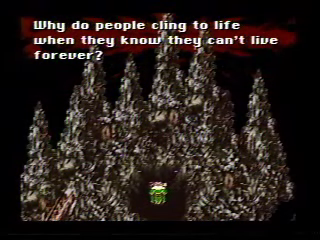
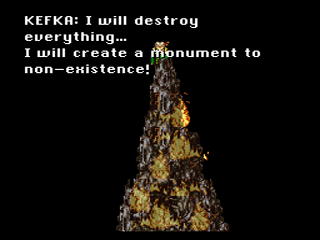
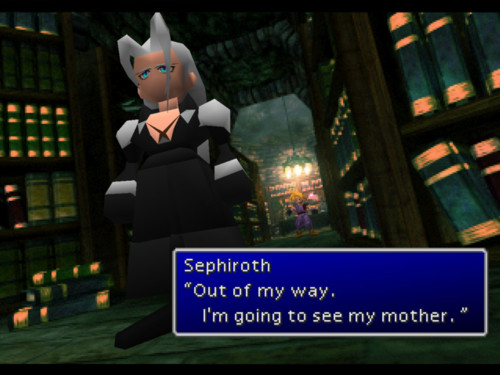
…and really, Sephiroth’s last lines of dialogue in the entire game are in a flashback sequence. Sephiroth, then, is really a internal problem of the mind, a remnant of the past, and something that must be resolved for true human life to flourish.
And, not surprisingly, it is only when a few people realize the importance and interconnectedness of all life, even the Planet, that the Planet responds in kind. The Ancients, obviously, knew that lesson; Aeris’ death, basically, shows that humanity must admit to their own flaws if they wish for salvation from the current state of affairs. If the ending is any indication, humanity had to be destroyed to keep the balance (soiled by the Advent Children whitewash), but it’s a powerful tale on the macrocosmic scale.
On the microcosm, things are just as revelatory. The story revolves around Cloud, and he is humanity represented quite accurately: self-assured, proud of the achievements of civilization, prideful in their accomplishments, unwilling to admit any fault of their own. However, what we learn is that Cloud’s life as depicted in the game was mostly a lie, that Cloud wanted to follow a role-model to mask his own insecurities. In the same way that, for example, a Christian wishes to follow Christ, Cloud wants to follow Zack’s footsteps in SOLDIER and become just as good as he was. But the way you do that isn’t to absorb the person and become that person; it’s to take all that was good, and become a personality. This could also be said of Christianity, in that God wants us to become Christ-like, not Christ Himself; I cannot be God, after all. So it is with Cloud, and much of the game is spent in this identity crisis, whether that is revealed to the audience or not. Tifa ends up being Cloud’s only tether to actual reality, and in the end the things that actually happened to him end up bringing Cloud to terms with his past.
On another level, Cloud is the human being, triumphant winner and penultimate loser, a bundle of contradictions and seemingly level-headed thinking. Cloud only thinks of himself; one only has to look at the introduction of the game itself to see Cloud, as mercenary, is really only doing AVALANCHE’s work for the money. Yet, over time, as he meets old friends and gains new ones, he realizes he can’t just stick to himself, stay as a introvert forever. That’s just not how a real life is lived. The move beyond Midgar is as much a turning point in self-discovery – why else would we have to traverse among the landscape of the world if not to see its diversity, color, and the human life which comes in a variety of forms and shapes? What am I saving – most games now focus on what I am defeating, but FFVII establishes what is being saved without the player ever even noticing it.
Nor can he be someone else. The wrongs in life have to be righted by someone; our disguised quests for power, understanding, and knowledge have to end somewhere, and all explanantions end somewhere. So it is that Sephiroth represents those flaws in humanity, the things that make us insecure, selfish, horrible, and sinful people. Cloud’s final victory blow (in his mind, no less) is both for him, and for us, a cathartic moment.
And certainly, you could take a existentialist perspective, as most RPGs commentators are wont to do, but I obviously can’t; there is a redemptive message here. Obviously, the Planet isn’t going to destroy us for our transgressions, but we will certainly destroy ourselves if we continue acting in that way. I’m no environmentalist, by any means, but the symbolism still strikes me as important because it implicates human being for the morality of their behavior, and that there is a cosmic order of good and evil out there. Sometimes, there must be consequences, “For though by this time you ought to be teachers, you have need again for someone to teach you the elementary principles of the oracles of God, and you have come to need milk and not solid food. For everyone who partakes onlyof milk is not accustomed to the word of righteousness, for he is an infant. But solid food is for the mature, who because of practice have their senses trained to discern good and evil.”(Hebrews 5:12-14)
With all my talk, it’s still a bit hyperbolic. Not to over-do it, but Final Fantasy VII is not the story of the century, nor the best game ever created by human beings ever. Parts of this are me simply injecting more into the story than is there, probably. Still, It simply conveys and worms its way into the public consciousness in a way no game since has successfully done. Much of this has to do with the story and the way it is presented, and I think it’s still difficult to explain this; many have tried and failed.
Still, it’s a video game, and what would a video game be if you didn’t actually play it? My God, I haven’t even talked about the game! All these plot elements are actually integrated into the battle system. The game slowly eases you into all its system and game types. Honestly, the only real tutorial you’ll need for the game is the Materia system, and even then Materia are more about discovering excellent combinations and strategies for combat than anything else. You can die, contrary to popular belief, and some fights require a bit of out-of-the-box thinking to proceed. The battles don’t stop, either; it’s fast and furious, much more-so than even FFXIII’s supposed system which makes choices for you (most times, the optimal choice). Proud Clod killed me more times than I’d like to admit. Status effects actually hurt you badly! I was surprised to find it wasn’t all “slam the attack button and win”.
As well, Materia is crystallized Lifestream, so it actually derives directly from the Planet. Just as Shinra sucks the life out, others can use the power given to save the Planet. In battle, characters show personality by the way they attack. Limit Breaks are especially representative of this, in that they show the way characters use their talents, whatever they might be, in battle. And, like the snowboarding noted earlier, there are a LOT of minigames in Final Fantasy VII. They’re wacky, fun, and completely out of place in such a serious story, is what someone entirely more cynical might say. They show an identity crisis. They’re part of a video game! Sure, the world waits for you to save it, but why not do some chocobo racing, or feed a moogle some nuts, or race around, or play a real-time strategy game? They break up the action, that’s for sure.
The music, of course, is superb. What video gamer can’t actually hum at least part of the intro, the Bombing Run, One-Winged Angel, or any other number of classics? Certainly, the MIDI sound is a bit metallic or samey at times, but I think the limitations (as usual) provide a better experience. If you have a full 100-piece orchestra with absolutely no budget limitations (did somebody just say FFXIII? I think they did. Maybe it’s just me), your music just won’t be as memorable, especially if the game itself doesn’t have interesting set-pieces (really? Are you comparing FFVII and FFXIII again?) Honestly, I can’t list a single location from Final Fantasy XIII other than Cocoon and Pulse. And those are PLANETS, basically. Cosmo Canyon! Nibelheim! Golden Saucer! These all mean something through a combination of music, story, and imagery, and that’s why the soundtrack rocks.
That imagery also lends itself to establishing the setting, and pre-rendered backgrounds look marvelous, to say the least. It’s difficult to put into words, so here’s this:
And this:
They establish the atmosphere pretty well, don’t you think?
However, any game has its flaws, and Final Fantasy VII has quite a few. Why, for example, is the whole flashback with Cloud and Zack relegated to a sidequest? I find it hard to believe that that particular segment isn’t essential to the plot, nor Vincent’s entire story. What were they thinking? I’m going to guess that they simply messed up, or they missed something, because these little asides flesh out much of what I discussed above, and without that, deciphering that these things actually happened is next to impossible.
Further, the game become extremely easy at the end. Any powerleveling at all will make the game a piece of cake to complete. Sure, I died a few times, but that was because I made sure I did not over level the game’s bosses; if there’s no challenge, then the victory feels rather empty, wouldn’t you say? I suppose this is more a limitation of balancing the game’s combat system (which, if Knights of the Round is any indication, it isn’t), and giving them the opportunity to shill a new version of the game in Japan with Emerald and Ruby Weapon, but I’d rather that kind of strategic thinking actually make its way to the main game, rather than as an aside. Why can’t the story and the game hold equal sway and influence?
Still, it doesn’t make it a mediocre game, nor a trainwreck. It’s a great game, not overrated, and it’s exactly what Hironobu Sakaguchi and his team wanted to make, and if we’d all give it a chance in the modern era, I’d think we could see that it was, in fact, an excellent game deserving of its reputation – just not the reputation that has been built around it by Square-Enix. To me, it represents what can be great about video games, and what they can actually teach us if we let them. That’s why it is on The List.

